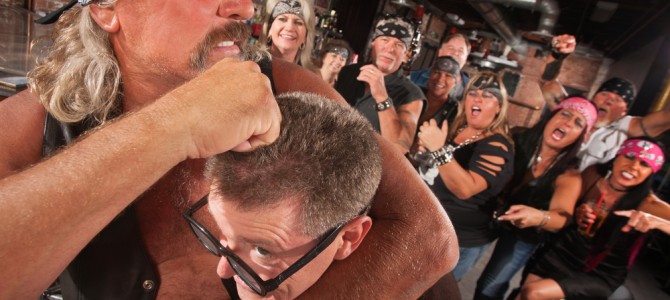
A controversial (and secretive) government program known as Operation Choke Point is finally receiving the negative attention that it deserves. Operation Choke Point flies in the face of the common-sense principle that law-abiding business owners should be allowed to stay in business. Instead, it cuts off legal businesses from financial services—often because unelected bureaucrats dislike certain industries.
The program, began by the Department of Justice in 2013, was the topic of a press conference outside the nation’s capital and a congressional hearing by the House Financial Services Oversight and Investigations Subcommittee last week.
Under Operation Choke Point, the Federal Deposit Insurance Corporation, a major player, uses its regulatory powers to intimidate banks into cutting off financial ties with businesses that the government views unfavorably. Banks and payment processors are threatened with increased federal scrutiny, such as additional audits, if they do not comply with FDIC’s dictates.
No Credit For You
Businesses that cannot bank in America cannot stay open, so this weaponization of government has real consequences. Take Kat O’Connor, owner of TomKat Ammunition in Maryland. She was cut off from her bank’s payment processing service and then her third-party payment processor because she sold ammunition, even though she and her business partner are licensed to sell ammunition by the state.
For another example, consider the case of Wisconsin resident Mike Schuetz, owner of Hawkins Guns. His credit union said they must close down his bank account. The reason? Heritage Credit Union told Schuetz “they do not service businesses that deal in guns.”
Another innocent victim is Brennan Appel of North Carolina-based Global Hookah Distributors. Appel lost his bank and payment processor, even though his business legally operates in 19 states. When I asked Appel why the government was targeting the tobacco industry, he said that the reason was simple: “They just don’t like us.”
Business owners have many problems, and they do not need the additional headache of trying to find financial service companies that are willing to defy the wishes of their regulators.
Broken Promises of ‘Reform’
Brian Wise, a U.S. Consumer Coalition senior advisor who has worked to increase public awareness of Operation Choke Point, told me he personally knows of more than 100 victims of the program, but that this is a small percentage of the program’s total reach. There is no way to know the exact numbers of victims, since Americans are still kept in the dark about this secretive government program. But evaluating the number of businesses in the targeted industries shows that Operation Choke Point’s potential reach could number in the tens of thousands of businesses.
These personal stories show that Operation Choke Point is alive and well—even as regulators claim that it has been reformed.
In 2011, FDIC released an internal list of 30 “high-risk” industries that it later advised financial institutions to avoid. These types of businesses included, among others, those selling surveillance equipment, dating services, payday loans, firearms and ammunition, and tobacco. A House Oversight Committee report found that “FDIC explicitly intended its list of ‘high-risk merchants’ to influence banks’ business decisions. FDIC policymakers debated ways to ensure that bank officials saw the list and got the message.”
Four criteria used to determine FDIC’s high-risk classification were lack of consumer familiarity with the merchant, uncertain quality of goods and services, Internet or telephone sales, and difficult consumer verification of merchant identity or legitimacy. FDIC never identified why legitimate businesses such as TomKat Ammunition, Hawkins Guns, and Global Hookah Distributors fit these criteria, yet it still pushed banks to refuse services to these types of businesses.
Because of mounting public and congressional outrage, FDIC issued a statement on January 28 that de-emphasized its sweeping list of high-risk industries and instead urged banks to take a case-by-case approach.
I had previously written that FDIC’s retraction of its target list was a welcome development, but that it did not go far enough. However, Wise argues that eliminating the list means “doubling-down” on the program, since now financial services do not know who they can and cannot do business with without incurring the government’s wrath.
Illegally Ruining People’s Livelihoods
In a House hearing on March 24, FDIC Chairman Martin Gruenberg insisted that his agency was simply trying to inform banks about high-risk businesses in an attempt to reduce fraud, and that his agency never intended to threaten banks or blacklist industries. Skeptical of this claim, many representatives, including Sean Duffy (R-Wisconsin) and Bruce Poliquin (R-Maine), lambasted Gruenberg for not firing anyone over the program’s “un-American” methods. If the list of targeted industries was never supposed to be created, why has no one been fired for taking actions that directly led to the closure of law-abiding businesses?
Operation Choke Point was never intended to be public. Instead of openly outlawing industries of which regulators do not approve, the government uses Operation Choke Point to extort financial service companies so that those unfavorable industries are cut off from the tools necessary to run a business. Wise said about the program, “If it wasn’t so dangerous, I’d applaud the government for their ingenuity. The fact is Operation Choke Point is ruining the lives of innocent Americans.”
Programs as outrageous as Operation Choke Point do not need reform—they need to be ended. On this note, Sen. Marco Rubio (R-Florida) introduced legislation to end Operation Choke Point in February. His proposal would fully defund Operation Choke Point and prohibit the incoming attorney general from restarting it or instituting a similar program.
Americans should not have their livelihoods subjected to the whims of unelected bureaucrats who are operating outside of the law. If the administration will not act on its own, let us hope that Congress manages to close down Operation Choke Point.








